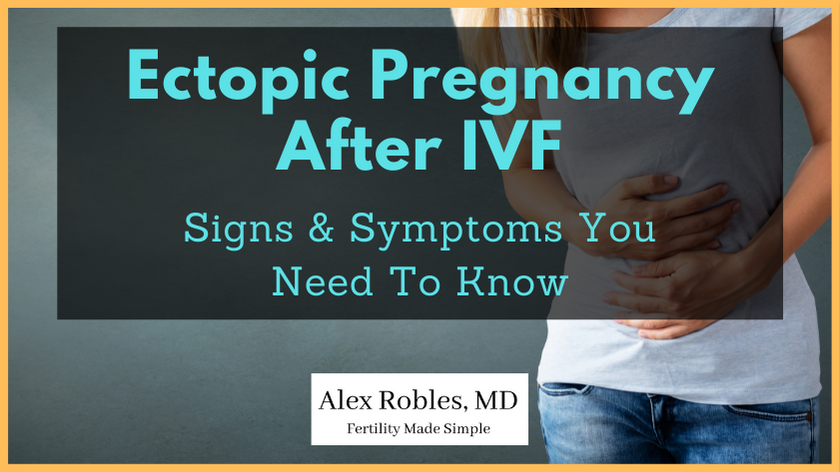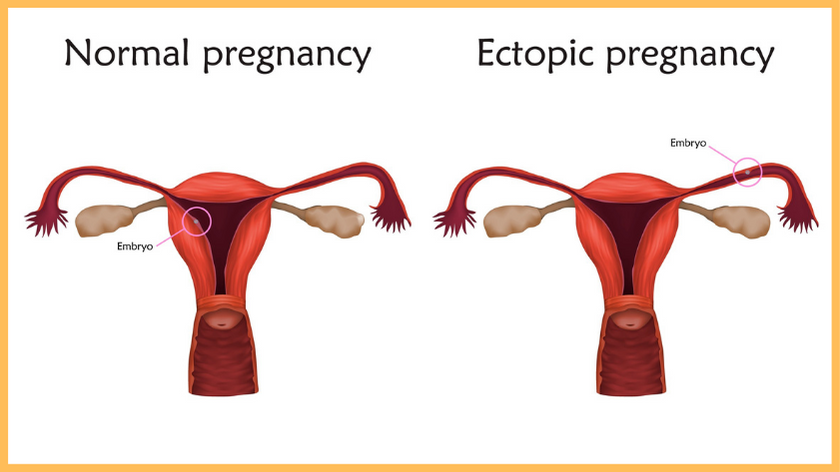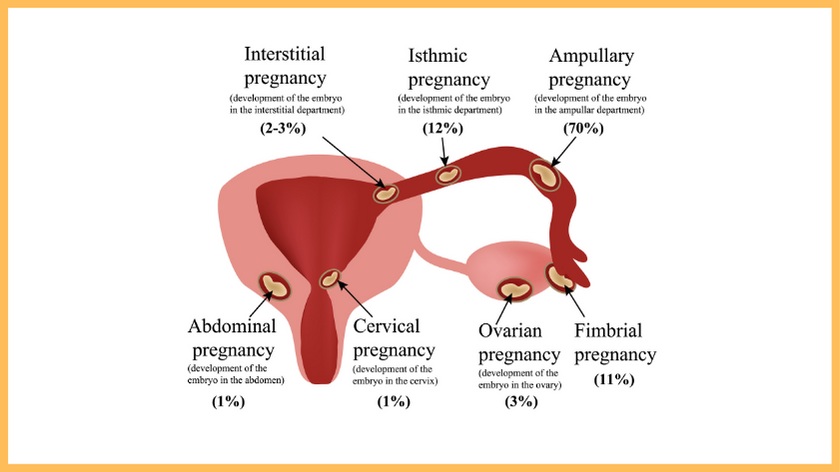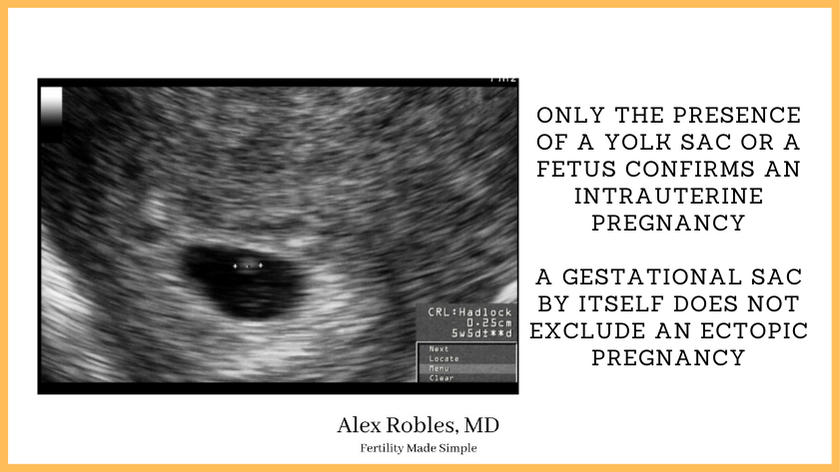Ectopic pregnancy is a very serious condition that can be life-threatening if not treated.
In this article, you will learn
- Common signs and symptoms of ectopic pregnancy following IVF or natural conceptions
- How soon an ectopic pregnancy can be detected
- What happens if your fallopian tube ruptures with an ectopic
And more.

Symptoms of Ectopic Pregnancy Following IVF
It is important to be aware of the signs and symptoms of ectopic pregnancy as early diagnosis and treatment are critical.
The most common ectopic pregnancy symptoms after IVF can include
- Sudden and severe pain on one side of your lower abdomen and/or back
- Nausea and/or vomiting
- Shoulder pain
- Vaginal bleeding
- Lightheadedness/ Feeling faint
- Palpitations
It is important to note that you may or may not have symptoms at all.
You may not have any symptoms depending on how early the ectopic pregnancy is.
Is ectopic pregnancy common in IVF?
Ectopics occurs in approximately 1-2% of all pregnancies after natural conception, and about 2-5% of all pregnancies following IVF.
Common risk factors include:
- Having a previous ectopic pregnancy
- History of tubal ligation (aka having your tubes tied)
- History of scarring on the fallopian tube from previous surgery or pelvic inflammatory disease (PID) (secondary to a gonorrhea/chlamydia infection)
- History of endometriosis
- Smoking
How does It Occur?
An ectopic pregnancy occurs when a fertilized egg implants itself outside the uterus and develops in another location, usually the fallopian tubes.
In IVF, your embryo is transferred into your uterus by using a small flexible catheter. This is usually done under ultrasound guidance, which means your doctor can see where in the uterus the transfer is occurring.
Unfortunately, the embryo can migrate its way from the uterine cavity and into the fallopian tube.

How Soon Can You Detect An Ectopic Pregnancy?
The earliest you can suspect an ectopic pregnancy after IVF is at approximately 5 weeks gestation.
The earliest you can see an abnormal rise is between weeks 4 and weeks 5 of gestation (which is 2 weeks following your embryo transfer).
Depending on your levels of b-hCG, a transvaginal ultrasound may be performed at approximately 6 weeks gestation to look for the location of the pregnancy.
If you develop concerning symptoms, the ultrasound scan can be performed sooner.
The good news is, we always keep a very close eye on anyone undergoing fertility treatment in an effort to catch an ectopic as soon as possible.
However, it is important to know that neither of these things confirms an ectopic pregnancy.
The only two ways of diagnosing an ectopic pregnancy
The diagnosis of an ectopic pregnancy can only be made with one of two methods:
They are:
- Performing a D&C procedure in someone with an abnormally rising b-hCG that shows no pregnancy tissue, or
- An ectopic pregnancy is literally visualized on ultrasound
One of these things is necessary to diagnose an extrauterine pregnancy with certainty.
In general, both of these can occur as early as 6-7 weeks of gestation.
What b-hCG levels raise concern for an ectopic?
There is no set b-hCG level that raises concern for an ectopic pregnancy.
What we look for is the trend. In general, we like to see the b-hCG level rising at a rate of ~50-100% every 48 hours.
A doubling of the b-hCG every 48 hours is a very good sign.
A b-hCG level that is rising at around 20-30%, or even slightly slower can raise concern for an ectopic pregnancy.
Your fertility doctor will look at this trend closely and help you make decisions quickly.
Can It be avoided?
Unfortunately, there is no way to avoid an ectopic pregnancy completely. If you have any underlying fallopian tube damage, you are at higher risk for an ectopic pregnancy to occur.
What percentage of ectopic pregnancies occur in the fallopian tube?
Approximately 95% of ectopic pregnancies occur in the fallopian tubes.
This is called a tubal ectopic pregnancy.
The remaining 5% develop in other locations in the abdomen/pelvis.
The different types of ectopic pregnancies
- Cervical ectopic (the embryo attaches to the lower cervix)
- Ovarian ectopic (the embryo attaches to the ovary)
- Abdominal ectopic (the embryo is inside the abdominal cavity)
- C-section scar ectopic (the embryo attaches to the scar tissue around the c-section incision)
- Cornual / Interstitial ectopic (in some rare cases, the embryo attaches at the insertion point of the fallopian tube into the uterus)

Does an ectopic pregnancy damage the fallopian tube?
If an ectopic pregnancy is caught at the very early stages, there is a good chance that there will be no damage to the fallopian tube.
If left untreated, an ectopic pregnancy could continue growing until it ruptures the fallopian tube.
With that said, a tubal pregnancy often indicates that there may already be some abnormality in the tube that led to the ectopic in the first place.
What happens if your fallopian tube ruptures?
A ruptured ectopic pregnancy is an absolute medical emergency as the rupture leads to internal bleeding which can lead to hemorrhage and shock.
Due to the heavy amount of internal bleeding that can occur, ruptured ectopics always require emergency surgery.
In these situations, your fallopian tube is removed through a small incision in order to control the bleeding. This type of surgery is called a laparoscopic salpingectomy.
Ruptured ectopics are treated aggressively because they are the leading cause of maternal death in the first trimester.
How long does it take for a tube to rupture in an ectopic pregnancy?
A tubal ectopic can rupture at any point. This can happen a few days after you become aware of the ectopic pregnancy or several weeks later.
Unfortunately, some can rupture before you are even aware of a positive pregnancy test.
The longer the time frame between implantation and detection, the greater the chance of the ectopic pregnancy rupturing.
Other Related Questions
Do you get pregnancy symptoms with ectopic pregnancy?
Pregnancy symptoms are common with ectopics because the pregnancy hormone (b-hCG) is still present in your system.
These include:
- breast tenderness,
- nausea and/or vomiting
- uterine cramping/ abdominal pain / pelvic pain
However, if you experience any of the other symptoms above, speak with your healthcare provider or seek medical attention right away.
Has any baby survived an ectopic pregnancy?
No, ectopic pregnancies are NOT viable pregnancies. They will not result in a normal pregnancy and need to be treated immediately.
Can I still have an ectopic pregnancy even with a gestational sac on ultrasound?
A gestational sac does not guarantee that you have an intrauterine pregnancy. It is possible to have a sac inside the uterus, and an early ectopic pregnancy elsewhere.

Are you more fertile after an ectopic?
Having an ectopic pregnancy does not make you more fertile. Unfortunately, having had a prior ectopic increase your risk of a future ectopic pregnancy occurring.
If you had one fallopian tube removed, it is possible to still get pregnant naturally with just one tube remaining.
If both of your tubes were removed, you need to undergo in vitro fertilization to become pregnant.
How long do you wait after an ectopic before having more children?
It depends on the method by which the ectopic was treated. If your ectopic was treated medically (with a methotrexate injection), you could try to get pregnant 12 weeks after the injection (~ 3 menstrual cycles).
If your ectopic was surgically removed, you can try again with your next period or wait until you recover from the surgery which can be ~4 weeks.
Check with your doctor as this varies greatly from person to person.
How do you treat an ectopic pregnancy?
There are two treatment options: medical and surgical treatment.
Medical treatment involves the use of an injection of methotrexate. This is a chemotherapeutic medication that stops rapidly dividing cells from growing. (The fetus is composed of rapidly dividing cells).
This approach has a success rate of about ~85% depending on the patient.
Laparoscopic surgery is needed in the remaining ~15% due to
- incomplete treatment with methotrexate,
- inability to take methotrexate due to allergies or other contraindications,
- or if your ectopic pregnancy has ruptured
In some rare cases, expectant management (waiting to see if the ectopic pregnancy resolves itself) can be reasonable.
Speak to your doctor to learn if this is an option for you.
Can I still have a normal pregnancy after?
Yes, with appropriate treatment and follow-up, you can have a successful pregnancy and give birth to a healthy baby in the future.
It is important to always get early care and have close follow-up for any future pregnancies.
Conclusion
Ectopic pregnancy is a very serious condition that can be life-threatening if not treated.
Although ectopic pregnancies account for about 2% of all pregnancies, they are the leading cause of maternal death in the first trimester.
If you experience any signs or symptoms, it is important to see your doctor as soon as possible to avoid any potential complications.
Related Posts:
- When To Check A Pregnancy Test After IVF: Reasoning & Expectations
- Can IVF Pregnancies Have A Normal Delivery?
Make An Appointment With Dr. Robles To Discuss Your Fertility Options Today!

Alex Robles, MD
Dr. Alex Robles is a Spanish-speaking Latino-American Reproductive Endocrinologist and Infertility specialist in New York City, and a board-certified OBGYN. He has a special interest in health, lifestyle, & nutrition. Make an appointment with Dr. Robles to discuss your fertility options today!
References:
- Refaat B, Dalton E, Ledger WL. Ectopic pregnancy secondary to in vitro fertilisation-embryo transfer: pathogenic mechanisms and management strategies. Reprod Biol Endocrinol. 2015;13:30. Published 2015 Apr 12. doi:10.1186/s12958-015-0025-0
- Pyrgiotis E, Sultan KM, Neal GS, Liu HC, Grifo JA, Rosenwaks Z. Ectopic pregnancies after in vitro fertilization and embryo transfer. J Assist Reprod Genet. 1994 Feb;11(2):79-84. doi: 10.1007/BF02215992. PMID: 7529603.
- Krause MS, Holthouser K, Gaskins JT, Bohler HCL, Nakajima ST. Initial hCG Levels in Ectopic Pregnancies After Embryo Transfer: Use of the Bayes Classifier for Risk Assessment. J Reprod Med. 2017 May-Jun;62(5-6):257-64. PMID: 30028101.
- Kirk E, Condous G, Bourne T. Ectopic pregnancy deaths: what should we be doing? Hosp Med. 2004 Nov;65(11):657-60. doi: 10.12968/hosp.2004.65.11.17044. PMID: 15566057.
- Cirik DA, Kinay T, Keskin U, Ozden E, Altay M, Gelisen O. Success rates of single-dose methotrexate and additional dose requirements among women with first and previous ectopic pregnancies. Int J Gynaecol Obstet. 2016 Apr;133(1):49-52. doi: 10.1016/j.ijgo.2015.08.017. Epub 2015 Dec 18. PMID: 26873120.
